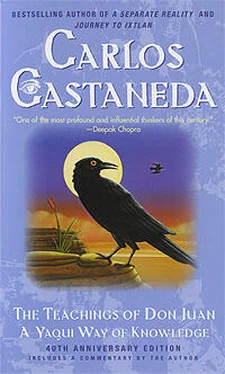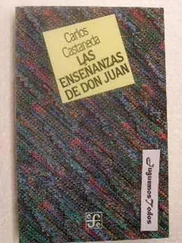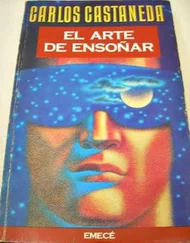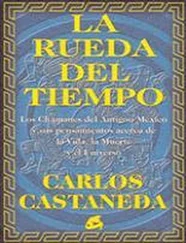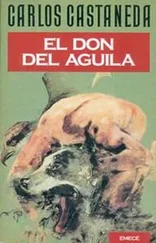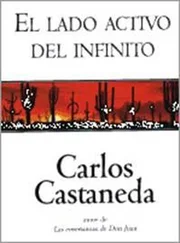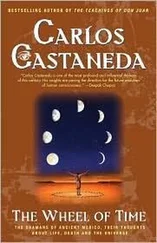Exertion entailed not only drama, but also the need of efficacy. Exertion had to be effective; it had to possess the quality of being properly channelled, of being suitable. The idea of impending death created not only the drama needed for overall emphasis, but also the conviction that every action involved a struggle for survival, the conviction that annihilation would result if one's exertion did not meet the requirement of being efficacious.
Exertion also entailed the idea of challenge, that is, the act of testing whether, and proving that, one was capable of performing a proper act within the rigorous boundaries of the knowledge being taught.
A man of knowledge was a warrior
The existence of a man of knowledge was an unceasing straggle, and the idea that he was a warrior, leading a warrior's life, provided one with the means for achieving emotional stability. The idea of a man at war encompassed four concepts: (1) a man of knowledge had to have respect; (2) he had to have fear; (3) he had to be wide-awake; (4) he had to be self-confident. Hence, to be a warrior was a form of self-discipline which emphasized individual accomplishment; yet it was a stand in which personal interests were reduced to a minimum, as in most instances personal interest was incompatible with the rigour needed to perform any predetermined, obligatory act.
A man of knowledge in his role of warrior was obligated to have an attitude of deferential regard for the items with which he dealt; he had to imbue everything related to his knowledge with profound respect in order to place everything in a meaningful perspective. Having respect was equivalent to having assessed one's insignificant resources when facing the Unknown.
If one remained in that frame of thought, the idea of respect was logically extended to include oneself, for one was as unknown as the Unknown itself. The exercise of so sobering a feeling of respect transformed the apprenticeship of this specific knowledge, which may otherwise have appeared to be absurd, into a very rational alternative.
Another necessity of a warrior's life was the need to experience and carefully to evaluate the sensation of fear. The ideal was that, in spite of fear, one had to proceed with the course of one's acts. Fear was supposed to be conquered and there was an alleged time in the life of a man of knowledge when it was vanquished, but first one had to be conscious of being afraid and duly to evaluate that sensation. Don Juan asserted that one was capable of conquering fear only by facing it.
As a warrior, a man of knowledge also needed to be wideawake. A man at war had to be on the alert in order to be cognizant of most of the factors pertinent to the two mandatory aspects of awareness: (1) awareness of intent and (2) awareness of the expected flux.
Awareness of intent was the act of being cognizant of the factors involved in the relationship between the specific purpose of any obligatory act and one's own specific purpose for acting. Since all the obligatory acts had a definite purpose, a man of knowledge had to be wide-awake; that is, he needed to be capable at all times of matching the definite purpose of every obligatory act with the definite reason that he had in mind for desiring to act.
A man of knowledge, by being aware of that relationship, was also capable of being cognizant of what was believed to be the expected flux. What I have called here the 'awareness of the expected flux' referred to the certainty that one was capable of detecting at all times the important variables involved in the relationship between the specific purpose of every act and one's specific reason for acting. By being aware of the expected flux one was supposed to detect the most subtle changes. That deliberate awareness of changes accounted for the recognition and interpretation of omens and of other un-ordinary events.
The last aspect of the idea of a warrior's behaviour was the need for self-confidence, that is, the assurance that the specific purpose of an act one may have chosen to perform was the only plausible alternative for one's own specific reasons for acting. Without self-confidence, one would have been incapable of fulfilling one of the most important aspects of the teachings: the capacity to claim knowledge as power.
To become a man of knowledge was an unceasing process Being a man of knowledge was not a condition entailing permanency. There was never the certainty that, by carrying out the predetermined steps of the knowledge being taught, one would become a man of knowledge. It was implicit that the function of the steps was only to show how to become a man of knowledge. Thus, becoming a man of knowledge was a task that could not be fully achieved; rather, it was an unceasing process comprising (1) the idea that one had to renew the quest of becoming a man of knowledge; (2) the idea of one's impermanency; and (3) the idea that one had to follow the path with heart.
The constant renewal of the quest of becoming a man of knowledge was expressed in the theme of the four symbolic enemies encountered on the path of learning: fear, clarity, power, and old age. Renewing the quest implied the gaining and the maintenance of control over oneself. A true man of knowledge was expected to battle each of the four enemies, in succession, until the last moment of his life, in order to keep himself actively engaged in becoming a man of knowledge. Yet, despite the truthful renewal of the quest, the odds were inevitably against man; he would succumb to his last symbolic enemy. This was the idea of impermanency.
Off-setting the negative value of one's impermanency was the notion that one had to follow the 'path with heart'. The path with heart was a metaphorical way of asserting that in spite of being impermanent one still had to proceed and had to be capable of finding satisfaction and personal fulfillment in the act of choosing the most amenable alternative and identifying oneself completely with it.
Don Juan synthesized the rationale of his whole knowledge in the metaphor that the important thing for him was to find a path with heart and then travel its length, meaning that the identification with the amenable alternative was enough for him. The journey by itself was sufficient; any hope of arriving at a permanent position was outside the boundaries of his knowledge.
The Second Unit
A man of knowledge had an ally
The idea that a man of knowledge had an ally was the most important of the seven component themes, for it was the only one that was indispensable to explaining what a man of knowledge was. In don Juan's classificatory scheme a man of knowledge had an ally, whereas the average man did not, and having an ally was what made him different from ordinary men.
Don Juan described an ally as being 'a power capable of transporting a man beyond the boundaries of himself'; that is, an ally was a power that allowed one to transcend the realm of ordinary reality. Consequently, to have an ally implied having power; and the fact that a man of knowledge had an ally was by itself proof that the operational goal of the teachings had been fulfilled. Since that goal was to show how to become a man of knowledge, and since a man of knowledge was one who had an ally, another way of describing the operational goal of don Juan's teachings was to say that they also showed how to obtain an ally. The concept 'man of knowledge', as a sorcerer's philosophical frame, had meaning for anyone who wanted to live within that frame only insofar as he had an ally.
I have classified this last component theme of man of knowledge as the second main structural unit because of its indispen— sability for explaining what a man of knowledge was.
In don Juan's teachings, there were two allies. The first was contained in the Datura plants commonly known as Jimson weed. Don Juan called that ally by one of the Spanish names of the plant, verb a del diablo (devil's weed). According to him any species of Datura was the container of the ally. Yet every sorcerer had to grow a patch of one species which he called his own, not only in the sense that the plants were his private property, but in the sense that they were personally identified with him.
Читать дальше
